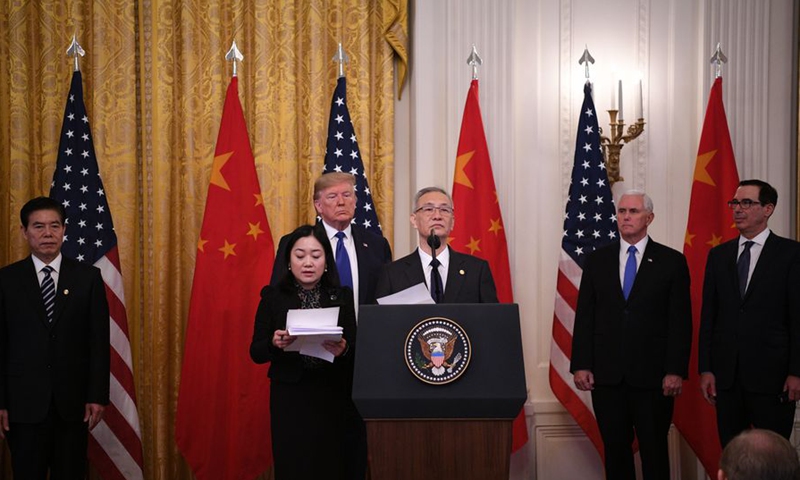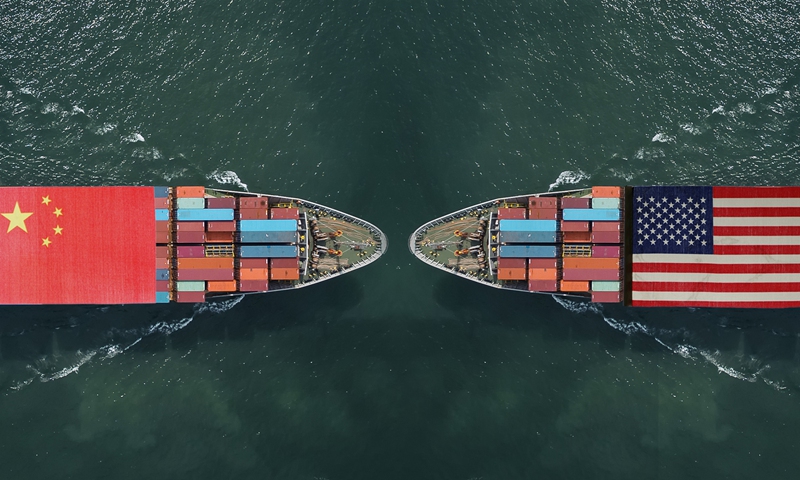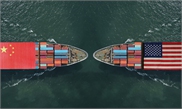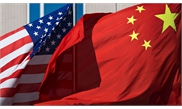China-US trade talk delay likely due to 'lack of atmosphere'
China sticks to commitment, urges US to remove restrictions

Chinese Vice Premier Liu He, who is also a member of the Political Bureau of the Communist Party of China Central Committee and chief of the Chinese side of the China-US comprehensive economic dialogue, speaks during the China-US phase-one trade deal signing ceremony held at the East Room of the White House in Washington DC, the US, January 15. Photo: Xinhua
The reported postponement of a widely anticipated meeting between top Chinese and US trade officials to review progress of the phase one trade agreement was likely due to the lack of a good "atmosphere" after a series of aggressive moves from the US against China in a wide range of areas, including crackdowns on Chinese tech firms, Chinese observers said on Monday.
Though Chinese officials never confirmed the reported meeting, they have repeatedly called on the US to create a better environment for the implementation of the phase one agreement, while maintaining that China's long-standing commitment to carry out the hard-fought agreement has not changed in spite of rapidly deteriorating bilateral relations.
The observers said that the Chinese side was likely to reiterate those calls in the potential meeting, which is part of the phase one agreement and could be scheduled sometime later.
'Lack of atmosphere'
Top Chinese and US trade officials were scheduled to meet on Saturday to review progress in the phase one agreement, but the meeting was postponed due to "scheduling conflicts" and the need to allow for China to purchase more US products, Reuters reported.
Reuters specifically said that the delay was related to a meeting of senior leaders of the Communist Party of China in Beidaihe, North China's Hebei Province, which usually takes place around mid-August. Other media reports also speculated that the postponement was due to China's lagging behind in carrying out terms of the deal, specifically the purchase of US products.
Neither Washington nor Beijing confirmed the date for the meeting. But under the phase one agreement, which went into effect in mid-February, senior trade officials would meet every six months to review the progress and address emerging issues.
While scheduling issues are possible, the main reason behind the postponement could be the lack of a proper atmosphere for both sides to sit down and talk, Chinese trade experts said.
"I think there were some [behind-the-scene] discussions that the US should reduce restrictions in certain areas, but that did not happen, so [the meeting] was pushed back indefinitely. There was no atmosphere for the meeting," Huo Jianguo, vice chairman of the China Society for World Trade Organization Studies who follows the China-US trade talks closely, told the Global Times on Monday.
Huo noted that the US appears to be "acting shamelessly" as it seeks to force China to speed up purchase of US products, while continuing to ratchet up restrictive policies on China. "Since the signing of the deal, there have been some changes in the China-US relationship. In other words, the US cannot pressure China to carry out the deal, all while moving relentlessly to sanction China," he said.
Defying widespread expectations that the phase one deal could help ease trade tensions between the two countries, the Trump administration has stepped its anti-China campaign through a flurry of actions, including crackdowns on Chinese tech firms such as TikTok, sanctions on the Hong Kong Special Administrative Region and arms sales to the island of Taiwan.
"First, the US crackdown could directly impact China's purchase, as it creates hurdles for the deal… Also, crackdown in other areas, though unrelated to bilateral trade, could also affect the atmosphere for China-US cooperation," Gao Lingyun, an expert at the Chinese Academy of Social Sciences, told the Global Times on Monday, adding that the Chinese side would "definitely" raise those issues with US officials, if the meeting were to take place.
Unchanged stance

Photo:Global Times
Still, Gao, who also follows the trade talks closely, stressed China's long-standing position that it would carry out the phase one agreement has not changed, whether the meeting was one or two weeks earlier or later than the expected date. "The consensus remains that we will stick to the commitment," he said.When asked about the meeting at a press conference on Thursday, Ren Hongbin, Assistant Minister of Commerce, did not confirm the talks but noted that China has been seriously implementing the agreement, though the COVID-19 pandemic and the US' restrictive measures on exports to China have "undoubtedly" impacted China's imports of some products and services.
Despite the pandemic and souring ties, China has been stepping up the purchases of US agricultural and energy products in recent weeks, according to US industry bodies and media reports.
"The purchase of soybeans has been relatively active recently," Zhang Xiaoping, country director for China at the US Soybean Export Council, told the Global Times on Monday, noting that China has bought as much as 2.3 million tons of US soybeans between August 7 and 14. In total, China has purchased 18.33 million tons of soybeans so far this year, Zhang said.
Under the phase one agreement, China has committed to increase its purchase of US agricultural and other products, including soybeans - a politically sensitive item for Trump - by $200 billion in a two-year period based on the 2017 level. Some media outlets had reported that China was far behind the target, which they claim to be behind the delay in the virtual meeting.
"That's definitely nonsense," Gao said, pointing out that there was no specific target set in the deal for every six months, but rather for the full year. "There is no such thing as China's purchase of US products falling below target."
However, Chinese trade officials and experts have repeatedly stressed that the US must also stop its aggression toward China to create a better environment to carry out the agreement.
"The problem is that [the US] did not work with China and did not create an atmosphere for the implementation of the phase one agreement," Huo said, noting that the deal is important for both sides, particularly at a time when communications through other channels have been seriously damaged. "I'm afraid this is the only channel left for communication between China and the US," he said.
At the press conference on Thursday, Ren also made clear the need for both sides to work together to implement the deal. "It is hoped that the US stops its restrictive measures and discriminatory actions against Chinese companies in order to create the conditions for implementing the phased economic and trade agreement," he said.



